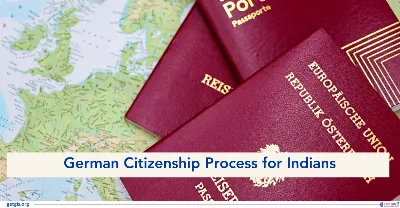Master’s in Data Science in Germany in 2026-27: Top Universities, Requirements, & Scholarships
Updated On
-
Copy link
Master’s in Data Science in Germany is a 1-2 year master’s program that covers subjects like machine learning, big data, data analytics, etc. 70% of the MS programs in data science in Germany are offered in English, emphasizing application-based learning
Limited-time offer : Access a free 10-Day IELTS study plan curated for you

Table of Contents
- Why Study Master’s in Data Science in Germany in 2026-27?
- Top Universities for Master’s in Data Science in Germany in 2026-27
- Eligibility Criteria to Study Master's in Data Science in Germany in 2026-27
- Master’s in Data Science in Germany Requirements for 2026-27
- Best Scholarships to Study Master’s in Data Science in Germany in 2026-27
- Jobs After Master’s in Data Science in Germany
- Pursue Your Data Science Career in Germany With GetGIS Assistance
Master’s in data science in Germany in 2026-27 is one of the top choices for aspirants, not just considering the low or no tuition fees, but also considering Germany’s data science and analytics market, which is expected to grow annually by 14% -18%, with an estimated 11.5 million job growth globally by 2026.
The deadlines for MS in data science in Germany for 2026 fall around May - June 2026, so before any delay, you would be required to understand the top universities, requirements, scholarships, etc, details for your admissions in 2026. So let's get started.
Why Study Master’s in Data Science in Germany in 2026-27?
We have listed a few reasons why you should consider doing your Masters in Data Science in Germany:
- Germany is famous for globally ranked institutions such as the Technical University of Munich, RWTH Aachen, etc, which are highly recognised for their cutting-edge research in Artificial Intelligence, Machine Learning, and Data Analytics.
- The employment rate for STEM and analytics graduates in Germany is more than 90% within six months of graduation, highlighting career opportunities in the country
- 70% of the MS programs in data science in Germany are offered in English (fully), reducing the language barrier and increasing study opportunities for international students
- Master's in Germany emphasizes application-based learning through internships, industry-linked research, and hands-on data projects with companies such as SAP, BASF, and Bosch.
Explore Intakes in Germany
Top Universities for Master’s in Data Science in Germany in 2026-27
The following universities in Germany, as per the QS World University Ranking 2024, are among the top choices for Data Science programs. You can explore a variety of academic offerings, their application deadlines, and the yearly tuition costs associated with each.
|
University |
QS World Ranking 2026 |
Program Offered |
Annual Fees (EUR) |
Application Deadlines (2026 Intake) |
IELTS / TOEFL Requirement |
|
Technical University of Munich (TUM) |
22 |
MSc in Data Engineering and Analytics / MSc in Data Science |
200–600 |
Winter 2026: Dec 2025 |
IELTS: 6.5 / TOEFL iBT: 88–100 |
|
Ludwig Maximilian University of Munich (LMU Munich) |
58 |
MSc in Data Science |
200–600 |
Winter 2026: Jan 2026 |
IELTS: 6.5 / TOEFL iBT: 90 |
|
Heidelberg University |
80 |
MSc in Data and Computer Science / MSc in Scientific Computing |
300–700 |
Winter 2026: Feb 2026 |
IELTS: 6.5 / TOEFL iBT: 90 |
|
Karlsruhe Institute of Technology (KIT) |
98 |
MSc in Data Science and Engineering |
300–600 |
Rolling (Oct 2025–Apr 2026) |
IELTS: 6.5 / TOEFL iBT: 90 |
|
RWTH Aachen University |
105 |
MSc in Data Science / MSc in Computational Engineering |
400–700 |
Winter 2026: Mar–Apr 2026 |
IELTS: 6.5 / TOEFL iBT: 90 |
|
University of Mannheim |
122 |
MSc in Data Science / MSc in Business Informatics |
400–600 |
Winter 2026: Feb–Mar 2026 |
IELTS: 6.5 / TOEFL iBT: 90 |
|
University of Freiburg |
138 |
MSc in Applied Data Science |
600–800 |
Jan–Apr 2026 |
IELTS: 6.0 / TOEFL iBT: 85 |
|
Technical University of Berlin |
181 |
MSc in Computer Science with Data Science Specialization |
400–700 |
Winter 2026: Apr 2026 |
IELTS: 6.5 / TOEFL iBT: 90 |
|
University of Stuttgart |
197 |
MSc in Data Science / MSc in Computational Linguistics |
300–700 |
Winter 2026: Feb 2026 |
IELTS: 6.5 / TOEFL iBT: 90 |
|
Frankfurt School of Finance & Management |
231 |
Master in Applied Data Science |
17,000 |
February 2026 |
IELTS: 7.0 / TOEFL iBT: 95 |
Also Read: Study at Best Public Universities in Germany in 2026
Eligibility Criteria to Study Master's in Data Science in Germany in 2026-27
Eligibility Requirements for a Master's in Data Science Program in Germany:
- A bachelor's degree in such as Mathematics, Computer Science, Statistics, or Business Administration.
- Proficiency in both English and German, as they are the primary languages of instruction.
- GRE Scores may be required if specified by the university.
- Submission of transcripts from previous academic qualifications.
- English proficiency requirements: TOEFL iBT (80-110) or IELTS (5.5-7).
- A comprehensive CV or resume.
- Valid passport.
- A minimum GPA of 2.5 on the German grading scale is required.
- Eligibility for a Germany Student Visa.
Master’s in Data Science in Germany Requirements for 2026-27
Now that we have understood the eligibility Requirements for a Master's in Data Science Program in Germany, let us further explore the documents needed to for your admission process:
- Academic transcripts
- English Language test score (like IELTS or TOEFL or German)
- GRE or GMAT score card (if applicable)
- Statement of Purpose (SOP)
- Updated resume or CV
- Letter of Recommendation (LOR)
- Recent passport-sized photograph
- Valid passport
- German Blocked Account
Explore the top Exams to Study Abroad
Best Scholarships to Study Master’s in Data Science in Germany in 2026-27
The following table offers a summary of scholarships in Germany, which are awarded by universities and government organizations. It delineates the particular criteria for eligibility and the respective values of the awards associated with each scholarship.
|
Scholarships |
Amount Offered |
|---|---|
|
TUM Scholarships |
One-time aid: EUR 500 - EUR 1500/Semester |
|
DAAD Scholarships |
EUR 934/month |
|
Heinrich Boll Foundation |
EUR 934 per month |
|
Deutschland Stipendium |
EUR 300 per month |
Also Read: Top Scholarships for Indian Students in Germany 2026
Jobs After Master’s in Data Science in Germany
International students in Germany have the option to apply for the 18-month post-study work visa to pursue job opportunities after completing a Master's in Data Science with prospects of earning an average salary of EUR 45,000 to EUR 60,000 annually. The best jobs after an MS in data science in Germany include:
|
Job Roles |
Average Annual Salary (EUR) |
|
Data Scientist |
56,024 |
|
ML Engineer |
55,549 |
|
Big Data Engineer |
58,669 |
|
Data Engineer |
58,669 |
|
Data Product Manager |
61,103 |
|
Data Analyst |
48,413 |
|
Business Analyst |
52,000 |
|
Data Modeler |
54,000 |
|
Statistician |
79,000 |
|
Quantitative Analyst |
57,352 |
Pursue Your Data Science Career in Germany With GetGIS Assistance
Studying master’s in data science in Germany in 2026-27 provides you with an opportunity to a global career in analytics, AI, and machine learning, which is backed by Germany’s innovation-driven economy and affordable education.
If you are looking for the right guidance for your career in data science or assistance with the admission process for an MS in data science in Germany, you can reach out to trusted study abroad experts like GetGIS. Our team provides end-to-end assistance on university selection, visa process, and more need for your a seamless study abroad journey.
Articles You Might Be Interested in
- Top 10 Benefits of studying in Germany for Indian Students in 2026
- IELTS Score Requirements for Studying in Germany
- Top Universities in Germany for Masters
- What Level of German is Required to Study in Germany in 2026?
- Cost of Studying in Germany
- 14 Things You Should Know Before You Start Working in Germany
Limited-time offer : Access a free 10-Day IELTS study plan curated for you

Frequently Asked Questions
How long does the Master's in Data Science program in Germany typically last?
Is it possible to pursue an MS in Germany without taking the GRE?
Is CGPA significant for pursuing an MS in Germany?
Is it possible to remain in Germany after finishing a Master's in Data Science in Germany?
Is Germany a favourable choice for pursuing a Master's in data science?





